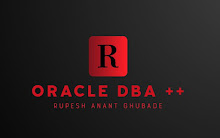Source DB Server:
OS: OEL 7.5
Database Name: ORCL
Pluggable DB Name: ORCLPDB
DB Version: 12.2.0.1
Schema: C##RUPESH => Local User
Tablespace: USERS
Target DB Server:
OS: OEL 7.5
Database Name: CLONE
DB Version: 11.2.0.4
Schema: RUPESH
TABLE: EMP
Tablespace: TEST
Step 1: Check current versions of both source and target DBs.
Source:
You can check whether pluggable feature is enabled or not using below command.
Source:
[oracle@test oracle]$ sqlplus / as sysdba
SQL*Plus: Release 12.2.0.1.0 Production on Sun Jun 10 19:47:43 2018
Copyright (c) 1982, 2016, Oracle. All rights reserved.
Connected to:
Oracle Database 12c Enterprise Edition Release 12.2.0.1.0 - 64bit Production
SQL> select banner from v$version;
BANNER
---------------------------------------------------------------------------
Oracle Database 12c Enterprise Edition Release 12.2.0.1.0 - 64bit Production
PL/SQL Release 12.2.0.1.0 - Production
CORE 12.2.0.1.0 Production
TNS for Linux: Version 12.2.0.1.0 - Production
NLSRTL Version 12.2.0.1.0 - Production
You can check whether pluggable feature is enabled or not using below command.
SQL> show pdbs
CON_ID CON_NAME OPEN MODE RESTRICTED
------ ----------- ---------- ----------
2 PDB$SEED READ ONLY NO
3 ORCLPDB READ WRITE NO
Target:
[oracle@clone oracle]$ sqlplus / as sysdba
SQL*Plus: Release 11.2.0.4.0 Production on Sun Jun 10 19:47:17 2018
Copyright (c) 1982, 2013, Oracle. All rights reserved.
Connected to:
Oracle Database 11g Enterprise Edition Release 11.2.0.4.0 - 64bit Production
With the Partitioning, OLAP, Data Mining and Real Application Testing options
SQL> select banner from v$version;
BANNER
--------------------------------------------------------------------------------
Oracle Database 11g Enterprise Edition Release 11.2.0.4.0 - 64bit Production
PL/SQL Release 11.2.0.4.0 - Production
CORE 11.2.0.4.0 Production
TNS for Linux: Version 11.2.0.4.0 - Production
NLSRTL Version 11.2.0.4.0 - Production
SQL> set lines 300 pages 3000
SQL> col directory_name for a13
SQL> col directory_path for a34
SQL> col owner for a13
SQL> select * from dba_directories where directory_name='DIR';
OWNER DIRECTORY_NAM DIRECTORY_PATH
------------- ------------- ----------------------------------
SYS DIR /u01/app/oracle/
SQL> select username,account_status,default_tablespace from dba_users where username='C##RUPESH';
USERNAME ACCOUNT_STATUS DEFAULT_TABLESPACE
---------- ---------------- -------------------
C##RUPESH OPEN USERS
SQL>
conn c##rupesh
Enter
password:
Connected.
SQL>
select * from dept;
ID NAME
----------
------------
1 A
1 A
1 A
1 A
Step 3: Take export of the table in source DB.
[oracle@test oracle]$ expdp directory=DIR dumpfile=version_expdp_dept.dmp logfile=version_expdp_dept.log tables=C##RUPESH.dept version=11.2
Export: Release 12.2.0.1.0 - Production on Sun Jun 10 20:14:37 2018
Copyright (c) 1982, 2017, Oracle and/or its affiliates. All rights reserved.
Username: system@ORCLPDB
Password:
Connected to: Oracle Database 12c Enterprise Edition Release 12.2.0.1.0 - 64bit Production
Warning: Oracle Data Pump operations are not typically needed when connected to the root or seed of a container database.
Warning: Oracle Data Pump is exporting from a database that supports long identifiers to a version that does not support long identifiers.
Starting "SYSTEM"."SYS_EXPORT_TABLE_01": system/********@ORCLPDB directory=DIR dumpfile=version_expdp_dept.dmp logfile=version_expdp_dept.log tables=C##RUPESH.dept version=11.2
Processing object type TABLE_EXPORT/TABLE/TABLE_DATA
Processing object type TABLE_EXPORT/TABLE/TABLE
. . exported "C##RUPESH"."DEPT" 5.507 KB 4 rows
Master table "SYSTEM"."SYS_EXPORT_TABLE_01" successfully loaded/unloaded
******************************************************************************
Dump file set for SYSTEM.SYS_EXPORT_TABLE_01 is:
/u01/app/oracle/version_expdp_dept.dmp
Job "SYSTEM"."SYS_EXPORT_TABLE_01" successfully completed at Sun Jun 10 20:15:12 2018 elapsed 0 00:00:22
Copy exported dump file to target server.
[oracle@test
oracle]$ scp version_expdp_dept.dmp oracle@clone:/u01/app/oracle/
oracle@clone's
password:
version_expdp_dept.dmp
100% 140KB 24.1MB/s
00:00
Import the exported dump in target db.
[oracle@clone
oracle]$ impdp directory=DIR dumpfile=version_expdp_dept.dmp
logfile=version_impdp_dept.log tables=C##RUPESH.dept
remap_schema=C##RUPESH:RUPESH remap_tablespace=USERS:TEST
Import:
Release 11.2.0.4.0 - Production on Sun Jun 10 20:16:32 2018
Copyright
(c) 1982, 2011, Oracle and/or its affiliates.
All rights reserved.
Username: /
as sysdba
Connected
to: Oracle Database 11g Enterprise Edition Release 11.2.0.4.0 - 64bit
Production
With the
Partitioning, OLAP, Data Mining and Real Application Testing options
Master
table "SYS"."SYS_IMPORT_TABLE_01" successfully
loaded/unloaded
Starting
"SYS"."SYS_IMPORT_TABLE_01": /******** AS SYSDBA directory=DIR
dumpfile=version_expdp_dept.dmp logfile=version_impdp_dept.log tables=C##RUPESH.dept
remap_schema=C##RUPESH:RUPESH remap_tablespace=USERS:TEST
Processing
object type TABLE_EXPORT/TABLE/TABLE
Processing
object type TABLE_EXPORT/TABLE/TABLE_DATA
. .
imported "RUPESH"."DEPT" 5.507 KB 4 rows
Job "SYS"."SYS_IMPORT_TABLE_01"
successfully completed at Sun Jun 10 20:16:38 2018 elapsed 0 00:00:02
SQL>
conn rupesh
Enter
password:
Connected.
SQL>
select * from tab;
TNAME TABTYPE CLUSTERID
------- ------- ----------
DEPT TABLE
EMP TABLE
SQL>
select * from dept;
ID NAME
----------
------------
1 A
1 A
1 A
1 A
Thanks for reading this post ! Please comment if you like this post !




Its an important for EXPDP and IMPDP with version parameter..
ReplyDeletenicely explain Rupesh Sir
ReplyDeletetuopilFcor-wo John Ross https://colab.research.google.com/drive/1uRXN0Sl1yDW7da85K9IaAkKX8Lqj_JQS
ReplyDeletedownload
link
click here
seotrondastma
Ulocimusko Kim Waters Comment
ReplyDeleteDownload
awesome
salopgovel
riluAcrys_za Joseph Deniro Awesome
ReplyDeleteThis is there
Software
apcetabvi